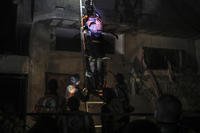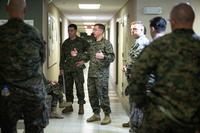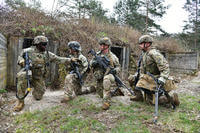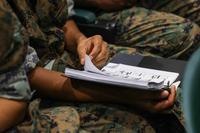Great news: "North Korea agreed to end its nuclear weapons program this morning in return for security, economic and energy benefits," the New York Times is reporting.
The United States, North Korea and four other nations participating in nuclear negotiations in Beijing signed a draft accord in which Pyongyang promised to abandon efforts to produce nuclear weapons and re-admit international inspectors to its nuclear facilities. Foreign powers said they would provide aid, diplomatic assurances and security guarantees and consider North Korea's demands for a light-water nuclear reactor...
The new agreement commits North Korea to scrap all of its existing nuclear weapons and nuclear production facilities, to rejoin the Nuclear Non-Proliferation Treaty, and to re-admit international nuclear inspectors. North Korea withdrew from the treaty and expelled inspectors in 2002.
The United States and North Korea also pledged to respect each other's sovereignty and right to peaceful co-existence and to work toward normalization of relations. The two countries do not have full diplomatic relations and did not sign a peace treaty after the Korean War...
"It is significant that the countries have agreed on a broad set of principles," said Koh Yu Hwan, a North Korea expert at Dong Guk University in Seoul. "But they postponed addressing the hot-potato issues to prevent the talks from collapsing."
Most pointedly, the agreement finesses the North Korean demand that proved the biggest stumbling block in the latest round of talks -- its condition that the outside world provide a light-water nuclear reactor that it says it will use to produce electricity. The issue is left essentially unresolved, potentially leaving both sides to claim that their views prevailed.
The reactor "is not the only sticking point," the L.A. Times notes.
The Bush administration wants a far more extensive nuclear dismantlement than occurred after the 1994 treaty. North Korea is expected not only to dismantle its plutonium-based weapons program at Yongbyon, the country's main nuclear facility 60 miles north of Pyongyang, but also a secretive nuclear program based on highly-enriched uranium. It was news of the existence of this program in late 2002 that caused the earlier treaty to collapse.
North Korea had denied having a highly-enriched uranium program, and some other parties to the talks, notably China and Russia, have expressed doubts about the Bush administration's evidence.
In addition, North Korea will be forced to account for and dismantle its already-completed nuclear bombs, possibly as many as 13, which are believed to be hidden underground throughout the country.
Today's agreement skirted many of these difficult issues, which are likely to raise considerable hurdles in the next round of talks scheduled for November.
THERE'S MORE: Meanwhile, "the Pentagon may be having second thoughts about proposed revisions to its nuclear weapons doctrine that would allow commanders to seek presidential approval for using atomic arms against nations or terrorists who intend to use chemical, biological or nuclear weapons against the United States."
AND MORE: "The agreement punts on most of the contentious questions; buying time is a respectable diplomatic strategy -- but time favors the North Koreans (who keep stockpiling Plutonium)," says Arms Control Wonk Jeffrey Lewis, who studies Asian nuclear arsenals for a living.
I love the agreement, because my Republican buddies will have to shut their pie-holes about how the Clinton Administration blew it with North Korea. After five years of Bush, we still don't have a different plan than what the Clinton Administration did. The joint statement doesn't make any progress on the North Korean uranium enrichment program and the Bush Administration expressed it's "respect" for the DPRK's "right to peaceful uses of nuclear energy."
AND MORE: "It's a significant breakthrough. But it could easily have been accomplished two and a half years ago, had President George W. Bush been willing," argues Slate's Fred Kaplan. "It is also nothing like an actual agreement, just a preliminary step before the real negotiations where, if history holds, North Korea will frustrate us with tricks and backtracking, and we just have to hang on tight."








